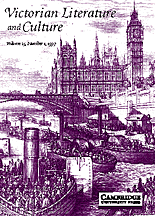‘Robert Browning and Victorian Poetry at 200’, Nov 1-3, 2012. Armstrong Browning Library, Baylor University.
To celebrate Robert Browning’s bicentenary in 2012, the Armstrong Browning Library is hosting an international conference that will focus on Browning’s importance within the broader field of Victorian poetry and poetics, and within Victorian studies more generally. Proposals are invited for short position papers, to be circulated in advance and discussed in seminars, on the themes detailed below. In addition to these theme-based seminars, conference attendees will also have the chance to participate in seminar discussions centered around particular Browning texts, led by notable Victorian poetry scholars.
Confirmed speakers and seminar leaders include Herbert Tucker, Yopie Prins, Isobel Armstrong, Daniel Karlin, Joe Phelan, Linda K. Hughes, Marjorie Stone, Donald Hair, Tricia Lootens, Warwick Slinn, Mary Ellis Gibson, Matthew Campbell, Charles LaPorte and Erik Gray.
The Armstrong Browning Library is an internationally renowned research center for the study of the Brownings and nineteenth-century literature and culture, located on the campus of Baylor University in Waco, Texas: http://www.browninglibrary.org/
To assist graduate students and early career academics to attend the conference, the ABL is offering 5 bursaries of $200, open to participants who are either currently graduate students or are within five years of receiving their PhD. Staff holding tenure-track positions are unlikely to be considered for these bursaries unless there are special circumstances. If you wish to apply, please state this clearly when you submit your proposal and attach a 1-page CV.
2-300 word proposals should be emailed to browning2012@baylor.edu. Please specify in your email which seminar you wish to participate in.
Deadline for proposals: 30 June 2012
Deadline to submit 5-page position paper: 1 October 2012
Further details will be available on the ABL’s website in due course. Any queries should be sent to the lead organizer, Kirstie Blair, at the conference email address: browning2012@baylor.edu.
SEMINARS
‘Browning’s Beginnings and Endings’ with Mary Ellis Gibson.
This seminar invites participants to reflect on beginnings and endings. How does Browning begin and end a career? or a volume of poetry? or an individual poem? From large to small, from the shape of a career, to the shape of a volume, to the shape of a particular poem, what can we learn when we reflect on beginnings and endings in Browning’s work? What kinds of disjunctions, what kinds of coherence, what kinds of surprises do we come upon by focusing on beginnings and / or endings? Participants will pre-circulate 5-page papers in which they reflect on some feature of beginning or ending in Browning's poetry.
‘Browning’s Contexts’ with Charles LaPorte.
How does Browning look from the vantage of the twenty-first century? This seminar will address the importance of historical, cultural, and social contexts for understanding this most canny and modern of Victorian poets. It invites participants to consider Browning's poetry in relation to Victorian politics, economics, religion, science, secularization, transatlanticism, globalization, etc. Participants will circulate a 5-page paper that addresses a specific historical context and some theoretical reflections for our discussion of its importance to Browning studies today.
‘The Sound of Browning’ with Matthew Campbell.
Alfred Tennyson said to William Allingham, ‘it doesn't matter so much in poetry written for the intellect - as much of Browning’s is, perhaps; but in mine it's necessary to know how to sound it properly’. This panel will suggest that this seemingly-hoary topic is never incidental to the reading of Browning. Participants are invited to circulate 5-page papers which might address how it relates to old and new thinking about voice and performance as well as Victorian and contemporary phenomenologies of rhythm and rhyme. The panel will think not just about the sound of Browning's verse but also broader matters of intellectual matter and poetic form. It may suggest new ways to sound Browning properly, testing his innovations against the still-pertinent matter of Browning’s technique and its vexed aesthetic relationships with experiment, proportion and sense.
‘The Brownings and Love’ with Erik Gray.
A hundred years ago, both Robert and Elizabeth Barrett Browning were thought of largely (and in EBB’s case, primarily) as love poets. But the situation now is entirely different. Partly in reaction to a surfeit of sentimental or biographical readings, Browning criticism has for many years consciously downplayed the significance of love in their poetry. And yet it is not only biographical curiosity that might lead a reader to take an interest in this topic. Love – divine, familial, but above all erotic – forms the central concern of many of the Brownings’ most important poems, and both poets made original and transformative contributions to the rich tradition of English love poetry. In the seminar, we will reconsider the Brownings’ treatment of love, with the aim, if possible, of tracing their mutual influence, as well as their response to the wider tradition. Participants will pre-circulate 5-page position papers relating to this topic.













